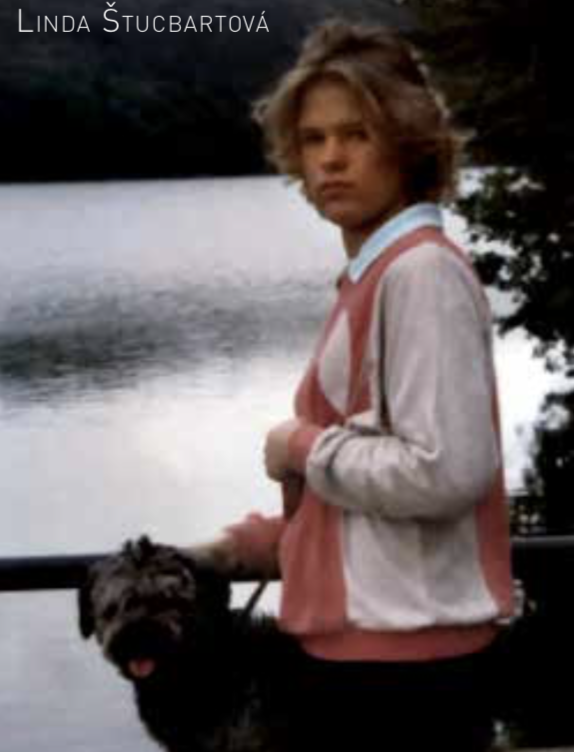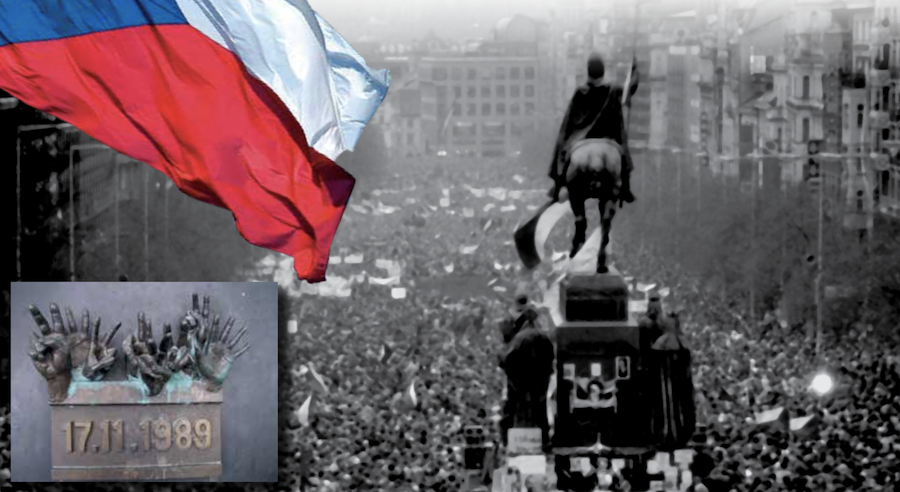A first hand account of a teenage girl
I was thirteen years old when the Velvet Revolution came. Only 13 or already 13? Thanks to having a sister who was ten years older, attending the Faculty of Medicine and active in the strike committee at the Charles University in Prague, I had not only first-hand information but also a great inspiration to become involved.
One of my lasting tangible memories is my mid-term and final report card from 1989/1990 term. It says “no-grade given” for the subjects of history and civics. The regime changed and teachers suddenly did not have any guidelines as to what to teach and how to grade. I still remember feeling freezing cold during my participation at the demonstrations either at the Wenceslas Square or Letná field during November days that were colder than usual in 1989. I remember proudly wearing jacket with Czech tricolors, cut out from the girls’ shoes which were obligatorily worn during the physical education classes . They were called jarmilky and were badly suited for any physical activity I still remember the change, expectations and fear of the unknown, as neither our parents and nor the teachers were able to answer the questions regarding the future.
After 30 years, I am still aware of the impact that the Velvet Revolution had on me. With many friends of my generation, we discussed the influence of the collapse of a régime at this young age. When you personally experience a regime change within six weeks (from the events on November 17 until the election of Václav Havel as the president on December 29, 1989), it definitely gives you a confidence on what is possible and what you can achieve. It was a stark contrast to what our parents experienced when their dreams were crushed by the Soviet Army in August 1968.
1. Childhood is always nice
Many nowadays tend to diminish the influence of the former régime on their lives on the account that they were surrounded by a loving family and friends, so their childhood was nice. I had loving parents, yet, I blame the communists for stealing my childhood. Thanks to the propaganda, I remember quite frequently discussing with my best friend on our way home from school whether the imperialists would truly attack “our beautiful, peaceful and prosperous country belonging to the socialist camp and only wishing peaceful and harmonious relationships with others”. The propaganda was accompanied by several civil defense education trainings per year. Dressed in raincoats, plastic bags tied tightly on our hands and feet, chemical masks on our faces, we had to run either in the forest or in the classroom. Upon the command: “Nuclear attack” we were supposed to lie down but! remember the essential rule – the head had to always face the other side than epicenter of the explosion, otherwise we were proclaimed dead. Since I suffer from no sense of direction, I died every time. Not to mention the shortage of larger sized chemical masks. Due to being one of the tallest in the classroom, I still remember the doubt and fear not only every time we practiced but also whenever I was listening to the propaganda communist news blaming the Blood Searching Imperialists for the imminent attack. Only lately, I have learned from my friends in the US, that they were subjected to the same propaganda rhetoric, this time blaming the Red Empire of Evil. We call ourselves “political generation”, since our childhood was so strongly influenced by world politics. I remember an evening TV fairy tale being cancelled on the occasion of the death of the Soviet leader. To me, as a child, this happened when Brezhnev died in November 1982, then Andropov in February 1984, and the same happened following the death of Chernenko in April 1984. Being an eight year-old pupil, I was hoping the almighty USSR would chose a leader that would last longer and we would not be deprived of our TV series. We all welcomed a young leader, full of energy, Mikhail Gorbachev with his slogans of “glasnost” (meaning increased openness) and “perestroika”(reform movement).
Meanwhile, I quickly learned that you speak about certain things at home and you say different things at schools. It all started with me bragging about my great grandfather being a famous personality with his name mentioned in the so-called Masaryk’s dictionary when I was in the third grade. Masaryk’s dictionary is the second largest encyclopedia volume after Encyclopedia Britannica, published during the First Czechoslovak Republic. As Masaryk and this period of Czechoslovak history did not fit the communist history outlines, my parents were summoned to school. Unfortunately, this stopped profound discussions with my grandmother Rose about her childhood. Later on, I was too busy living the Velvet Revolution that it was only after she died, I realized how much I missed from the intergenerational exchange. Certainly, I was not the only one. However, holding my tongue proved useful later when I started to listen to Radio Free Europe or Voice of America with my parents.

I learned how to adapt to my friends disappearing. Two of my close friends emigrated with their families without saying good-bye. I remember regularly visiting their empty flats sealed by the secret police hoping that they would return. Even my parents could not help, because admitting any knowledge about potential emigration was dangerous for anyone’s career.
The most sensitive part during my adolescence was perhaps the lack of toilet paper and female sanitary pads. At a very young age, I remember on my way home from school touring several shops asking if they had these items, being in the sensitive adolescent age. My mum had always delegated this task, to me. Leaving school earlier than her at work meant I would have a better chance of success in hunting for the high-demand goods. I wonder if I owe the Communist regime for start of my passion for women empowerment and gender equality.
2. Regime change was inevitable, imminent and discussed in advance therefore no need for uncertainty and fear
Setting conspiration theories aside, more and more people tend to diminish the brutality of the regime, including a current member of the Parliament, a representative of the communist party, Mr. Ondráček, who was at that time a special militia member beating up students. Others claim that the fall of the regime was only staged. I remember very well Wednesday, November 22, 1989. The tanks and the militia troops were close to Prague. No one knew whether they would use the brutal force to attack the protesters again. Some high officials in the army were considering using flying airplanes in low-level altitudes, that would severely damage hearing abilities, accompanied by already proven brutality of water cannons with the help of notoriously known brutal militia troops to crash the opposition of the growing number of demonstrators. Army troops were on high alert. Many people, my husband Rostislav being one of them, still remember the existential fear, which they faced when lying under the collapsing bodies, suffering lack of oxygen and being brutally beaten by armed forces. This WAS the reality. My parents begged me to come home directly from the school. I promised. After school, I put on tricolor flag and I went directly to the Wenceslas Square. As we reached the square rather early, we were very close to the Statue of St. Wenceslas and captured by TV crews. My parents were speechless when they saw their daughter on the main TV news. Only now, being a mother myself, I understand their fear. The images of crushing the demonstration of Tiananmen Square in June of that year were still too fresh, and certainly they put yet another flashback of 1968 reminiscence. “Sorry, mum and dad. I simply had to go”, I say after 30 years. In Prague, the communication was relatively easy. We should not forget the regions, outside of Prague. Not only students and demonstrators were under much bigger scrutiny, but also they had hard time to access the right information. Forget mobiles, social media and instant communication. Most households did not even have own landlines. And those who did, were to a great extent spied upon. Students from outside of Prague, workers who joined them and others were the true fighters for the freedom and their role should not be forgotten. Proving the unity of the whole country was essential. The general strike on Monday, November 27 proved that the country was truly united for the change. We should remember this lesson whenever the politicians nowadays try to misuse the division between us and them, Prague and the rest of the country. The motto of the Velvet Revolution: “The truth and love will overcome over lies and hatred” proved right on December 29, 1989, when Václav Havel was elected the president of Czechoslovakia.
3. Democracy means the ultimate victory
“Democracy is precious and fragile”, were the first words I said to my US Civics teacher, Mrs. Lyndeen Knapp, when I was 17 year-old exchange student, attending Colony High School in Palmer, Alaska and I continued: “I see that people in the US do not value democracy enough”. Sometimes, I wish I would be wrong. Meanwhile, I realized that democracy has stopped being valued not only in Western Europe, but also in Central Europe. Democracy for me means freedom. Freedom of expression, freedom to travel, freedom of religion, freedom of press, freedom to protest, just to name the most essential ones. I am trying to pass the legacy of the Velvet Revolution to the next generation, but I know that it is difficult. Democracy as a regime has been constantly challenged. Let me remind with Aristotle that “A democracy exists whenever those who are free and are not well-off, being in the majority, are in sovereign control of government, an oligarchy when control lies with the rich and better-born, these being few”. Democracy proved the proverb that it is as strong as its weakest part. And after 30 years, the Czech democracy has still many weak points. Yet, also many strong ones. The Supreme Court upholds the Constitution. New, free independent media are emerging to counterbalance both propaganda webs and media owned by business tycoons whose independence have been doubted. Young people start to be interested in the politics again. Their interests in truly global issues, such as climate and environment protection, responsible consumption, circular and shared economy, give me hope that they will carry on the message of democracy and freedom that needs to be constantly safeguarded and protected. As Václav Havel said: “Vision is not enough, it must be combined with venture. It is not enough to start up the steps. We must step up the stairs”.
“It was the most important year in the history of Europe”, said British historian Timothy Garton Ash. I continue with an appeal particularly to my generation: Let us remember, live and pass on this legacy.
By Linda Štucbartová


